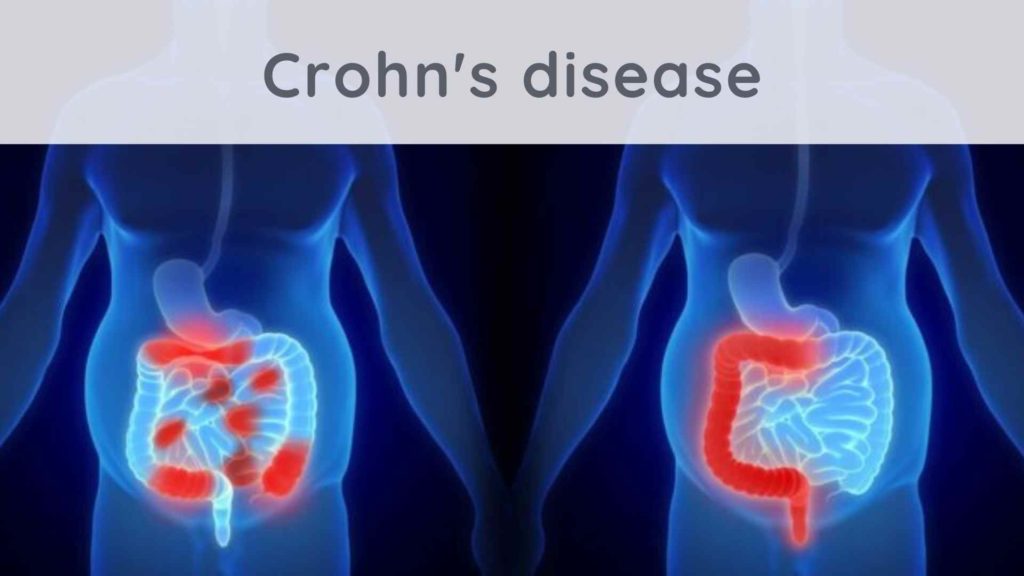Crohn’s disease: what solutions?
Written by: Loris Vitry (holistic coach)
Validated by: Cathy Maillot (Osteopath)
Caution: If you have any medical questions or concerns, please speak to your doctor. Even if the articles on this site are based on scientific studies, they do not replace professional medical advice, diagnosis or treatment.

Crohn’s disease is a disease that attacks the digestive system.
It is inflammatory and evolves by relapses.
It appears in people of all ages, but especially in young people.
Not all of its causes are known, but its symptoms are multiple and primarily digestive.
The uncertainty of certain causes explains the state of stress of people suffering from this disease.
However, to reduce the risk of complications, special attention must be paid to this disease in order to relieve the person who suffers from it.
The purpose of this article is to suggest ways to fight Crohn’s disease.
What is Crohn’s disease ?
Crohn’s disease is an inflammation of the lining of the digestive tract.
This disease attacks all parts of the digestive tract, the path from the mouth to the anus is not spared either.
However, the disease usually affects areas in the terminal part of the small intestine, anus, and colon.
We observe that the inflammation is present along the digestive tract and sometimes asymmetrical around the longitudinal axis of the digestive tract.
In young people aged 20 to 30, this disease wrecks more havoc than in adults.
A few cases are identified in adolescents and even children.
This disease progresses by successive attacks, interspersed with remissions of varying durations.
This disease can worsen over time if serious precautions are not taken for treatment.
Crohn’s disease : the causes
The factors behind Crohn’s disease are diverse, making it difficult to pinpoint the origin of the disease.
However, several factors could facilitate its appearance.
For starters, genetic factors may be the basis of Crohn’s disease.
People with many NOD2 / CARD15 genes have a predisposition to this disease.
Also, disorders of the intestinal flora can cause an abnormal immune reaction: this is called immunological factors.
The living environment and its maintenance can also favor this disease.
These can include environmental factors such as a diet high in refined sugar, bacterial and fungal infections and poor hygiene.
Crohn’s disease : symptoms
In general, this disease shows in the individual a general weight loss accompanied by fatigue and fever.
In children, there is a sudden loss of weight.
Symptoms can be grouped into two categories.
Digestive signs :
There are mainly stomach aches and diarrhea that never ends.
The patient has false urges to defecate.
Also, when the rectum is affected, the person can emit mucus and blood.
This is accompanied by anal pain that comes from bleeding and swelling of the perineum.
Extra-digestive manifestations :
Extra-digestive manifestations are rare, but these include inflammations in the joints, inflammation of the eye, rheumatism of the spine or dermatological damage.
Sometimes Crohn’s disease is unexpectedly discovered following an acute digestive complication.
In such cases, the disease has progressed in silence for years.
How to treat Crohn’s disease ?
There is a care that allows the patient to live normally.
Indeed, there is not yet a cure for Crohn’s disease.
The goal of treatment is to reduce symptoms, eliminate flare-ups, prevent falls and ensure a better quality of life for the patient.
For this, there are three methods : food, medication and surgery.
Opt for a healthy life
Hygiene measures make treatment for Crohn’s disease effective.
It is important to stop smoking when the individual is diagnosed with the disease.
This measure helps to space out flare-ups and reduce severe complication the disease.
Sometimes flare-ups can even go away.
Furthermore, avoiding stress is beneficial for the patient, as it can cause a flare-up.
Adopt a diet plan
The main thing to control is what you eat when you have flare-ups.
During this period, the patient should take fiber-free foods.
In other words, the individual must go on a diet that avoids vegetables, flour and fruit.
In addition, he should keep away from milk foods and polyol-free foods like sorbitol and so-called sugar-free dyes.
This measure makes it possible to combat the onset of seizures, pain and diarrhea.
Treatment with drugs
In recent years, the emergence of certain drug treatments has aimed to improve the quality of life for many patients.
The goal of these drug treatments is to postpone the need for surgery.
Doctors have offered several classes of drugs.
- Salicylated derivatives : these are the anti-inflammatory drugs
- Topical corticosteroids such as budesonide
- Systemic corticosteroids such as prednisolone.
- Immunosuppressants : there are 6 – mercaptopurine and azathioprine.
- Anti-TNF alpha biotherapies : adalimumab and infliximab.
- Antibiotics such as metronidazole and ciprofloxacin are also very effective.
However, as the causes and symptoms of the disease are different from one patient to another, it is important to seek medical advice before taking any of these drugs.
The use of surgery
When treatment with medication is unsuccessful, surgery becomes necessary.
The purpose of the operation is to remove parts of the damaged intestine.
However, removing injured areas of the intestine does not mean that it will no longer have lesions somewhere else in the intestine.
For this purpose and depending on the complication, colonoscopy, entero-CT, entero-MRI and enterocapsule can be performed.
It is clear that for such an intervention, the diagnosis and the management of the patient must be led by a multidisciplinary team which must take into account the symptoms, the age and the complication.
In conclusion, Crohn’s disease is essentially an inflammatory disease that affects the intestines.
Complications appears when the patient does not adopt a healthy lifestyle, does not follow dietary or medication recommandations, or does not undergo surgery to reduce severe flare-ups.
Continue reading:
Childbirth without an epidural : how to prepare ?

